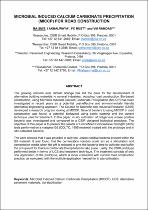JavaScript is disabled for your browser. Some features of this site may not work without it.
- ResearchSpace
- →
- Research Publications/Outputs
- →
- Conference Publications
- →
- View Item
| dc.contributor.author |
Smit, Michelle A

|
|
| dc.contributor.author |
Akhalwaya, Imraan

|
|
| dc.contributor.author |
Rust, FC

|
|
| dc.contributor.author |
Ramdas, Veshara

|
|
| dc.date.accessioned | 2022-10-03T06:50:52Z | |
| dc.date.available | 2022-10-03T06:50:52Z | |
| dc.date.issued | 2022-07 | |
| dc.identifier.citation | Smit, M.A., Akhalwaya, I., Rust, F. & Ramdas, V. 2022. Microbial Induced Calcium Carbonate Precipitation (MICCP) for road construction. http://hdl.handle.net/10204/12495 . | en_ZA |
| dc.identifier.uri | http://hdl.handle.net/10204/12495 | |
| dc.description.abstract | The growing concern over climate change has led the drive for the development of alternative building materials in several industries, including road construction. Bio-based construction, using Microbial Induced Calcium Carbonate Precipitation (MICCP) has been investigated in recent years as a potential cost-effective and environmentally friendly alternative engineering approach. The Council for Scientific and Industrial Research (CSIR) developed a research program looking at MICCP. Several barriers to using MICCP in road construction was found, a potential biohazard using exotic bacteria and the current technique used for treatment. In this paper, in situ cultivation of indigenous urease positive bacteria was investigated and compared to a CSIR designed biological prototype. The objective of this paper is to present the results of Unconfined Compressive Strength (UCS) tests performed on a marginal G5 (COLTO, 1985) material treated with the prototype and in situ cultivated bacteria. The work showed that it was possible to cultivate urease positive bacteria present within the G5 material. It was found that the cementation solution could act as a stimulation and cementation media when the pH is reduced to give the bacteria time to cultivate and buffer the pH upward for Calcium Carbonate Precipitation to take place. Lastly, the CSIR prototype performed better in terms of UCS and treatment technique. The treatment consists of only one application of the prototype, which is more consistent with current road construction practice, as compared with the multiple application needed for in situ cultivation. | en_US |
| dc.format | Fulltext | en_US |
| dc.language.iso | en | en_US |
| dc.relation.uri | https://www.satc.org.za/ | en_US |
| dc.relation.uri | https://www.satc.org.za/assets/final-announcement-brochure-and-programme_final2.pdf | en_US |
| dc.source | The 40th Annual Southern African Transport Conference 2022, CSIR ICC, Pretoria, 4-7 July 2022 | en_US |
| dc.subject | Alternative pavement materials | en_US |
| dc.subject | Bio-stabilisation | en_US |
| dc.subject | Microbial Induced Calcium Carbonate Precipitation • | en_US |
| dc.subject | MICCP | en_US |
| dc.subject | Unconfined Compressive Strength | en_US |
| dc.subject | UCS | en_US |
| dc.title | Microbial Induced Calcium Carbonate Precipitation (MICCP) for road construction | en_US |
| dc.type | Conference Presentation | en_US |
| dc.description.pages | 14 | en_US |
| dc.description.note | Paper presented at the 40th Annual Southern African Transport Conference 2022, CSIR ICC, Pretoria, 4-7 July 2022 | en_US |
| dc.description.cluster | Smart Mobility | en_US |
| dc.description.cluster | Chemicals | en_US |
| dc.description.impactarea | Pavement Design and Construction | en_US |
| dc.description.impactarea | BT: Processing | en_US |
| dc.identifier.apacitation | Smit, M. A., Akhalwaya, I., Rust, F., & Ramdas, V. (2022). Microbial Induced Calcium Carbonate Precipitation (MICCP) for road construction. http://hdl.handle.net/10204/12495 | en_ZA |
| dc.identifier.chicagocitation | Smit, Michelle A, Imraan Akhalwaya, FC Rust, and Veshara Ramdas. "Microbial Induced Calcium Carbonate Precipitation (MICCP) for road construction." <i>The 40th Annual Southern African Transport Conference 2022, CSIR ICC, Pretoria, 4-7 July 2022</i> (2022): http://hdl.handle.net/10204/12495 | en_ZA |
| dc.identifier.vancouvercitation | Smit MA, Akhalwaya I, Rust F, Ramdas V, Microbial Induced Calcium Carbonate Precipitation (MICCP) for road construction; 2022. http://hdl.handle.net/10204/12495 . | en_ZA |
| dc.identifier.ris | TY - Conference Presentation AU - Smit, Michelle A AU - Akhalwaya, Imraan AU - Rust, FC AU - Ramdas, Veshara AB - The growing concern over climate change has led the drive for the development of alternative building materials in several industries, including road construction. Bio-based construction, using Microbial Induced Calcium Carbonate Precipitation (MICCP) has been investigated in recent years as a potential cost-effective and environmentally friendly alternative engineering approach. The Council for Scientific and Industrial Research (CSIR) developed a research program looking at MICCP. Several barriers to using MICCP in road construction was found, a potential biohazard using exotic bacteria and the current technique used for treatment. In this paper, in situ cultivation of indigenous urease positive bacteria was investigated and compared to a CSIR designed biological prototype. The objective of this paper is to present the results of Unconfined Compressive Strength (UCS) tests performed on a marginal G5 (COLTO, 1985) material treated with the prototype and in situ cultivated bacteria. The work showed that it was possible to cultivate urease positive bacteria present within the G5 material. It was found that the cementation solution could act as a stimulation and cementation media when the pH is reduced to give the bacteria time to cultivate and buffer the pH upward for Calcium Carbonate Precipitation to take place. Lastly, the CSIR prototype performed better in terms of UCS and treatment technique. The treatment consists of only one application of the prototype, which is more consistent with current road construction practice, as compared with the multiple application needed for in situ cultivation. DA - 2022-07 DB - ResearchSpace DP - CSIR J1 - The 40th Annual Southern African Transport Conference 2022, CSIR ICC, Pretoria, 4-7 July 2022 KW - Alternative pavement materials KW - Bio-stabilisation KW - Microbial Induced Calcium Carbonate Precipitation • KW - MICCP KW - Unconfined Compressive Strength KW - UCS LK - https://researchspace.csir.co.za PY - 2022 T1 - Microbial Induced Calcium Carbonate Precipitation (MICCP) for road construction TI - Microbial Induced Calcium Carbonate Precipitation (MICCP) for road construction UR - http://hdl.handle.net/10204/12495 ER - | en_ZA |
| dc.identifier.worklist | 25966 | en_US |






